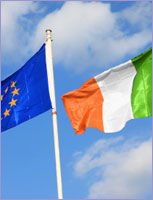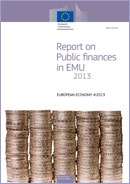|
|
|
|
|
|
 |
 |
 |
 |
Review mission sees Ireland’s programme on track; market financing needs reduced
Staff teams from the European Commission (EC), European Central Bank (ECB), and the International Monetary Fund (IMF) visited Dublin during 9-18 July 2013 for the eleventh review of the government’s economic programme. Ireland’s programme remains on track and yields on sovereign bonds are well below their levels of recent years. Discussions with the authorities focused on how best to address the remaining challenges, especially the fiscal deficit, unemployment, and banks’ nonperforming loans. While economic activity has weakened more than previously estimated, unemployment, though still high, has dropped to a three year low. Moreover, recent developments, including European decisions to extend loan maturities, have further reduced Ireland’s market financing needs. Conclusion of this review, and approval by the EU and the IMF, would make available disbursements of EUR 2.3 billion by the European Financial Stability Facility (EFSF), EUR 0.8 billion by the IMF, and EUR 0.3 billion by bilateral creditors. The next review mission is scheduled for October 2013.
|
 |
 |
 |
|
 |
 |
 |
 |
 |
|
 |
 |
 |
| I want to underline that a successful exit from EU-IMF programme of economic reform and adjustment will benefit not only Ireland […], but the entire euro area. |
 |
Olli Rehn, Vice-President of the European Commission
|
|
|
|
 |
 |
 |
 |
Commission says Latvia’s preparations for euro adoption well advanced, but further efforts necessary
The European Commission has adopted a report on the state of practical preparations for the introduction of the euro in Latvia. The report adopted on 23 July concludes that preparations are well advanced overall, but recommends further efforts in some areas. Latvia will become the 18th member of the euro area when it adopts the euro on 1 January 2014. The Commission report advises the Latvian authorities to increase the number of staff available for the monitoring of dual price display and implementation of the Fair Euro Introducer Memorandum. It also notes the importance of facilitating euro cash supply for smaller retailers; of promoting use of the official conversion rate for foreign exchange transactions already as of July 2013; and of ensuring that all ATMs are converted to the euro by 1 January 2014. Preparations by enterprises should also start at full speed now, according to the Commission. The Commission will reassess Latvia's practical preparations for introducing the euro, including its response to the recommendations set out in the report and the effects of an on-going information campaign, later this year.
|
 |
|
 |
 |
|
 |
 |
 |
 |
G20 Finance Ministers and Governors discuss structural reforms and new measures to fight tax evasion and avoidance
Vice-President Rehn participated in the G20 Finance Ministers and Central Bank Governors meeting held in Moscow on 19-20 July. The purpose of the meeting was to prepare the St. Petersburg Summit that will take place on 5-6 September. Ministers discussed the global economic situation and the risks to the economic outlook. Rehn presented the recent measures that have been taken in the European Union to address financial fragmentation and to move towards banking union. Given that a near term priority for all countries is to boost jobs and growth, Ministers agreed that the St. Petersburg Action Plan must include a comprehensive series of structural reforms that aim at increasing productivity, labour force participation and employment. EU Commissioner Šemeta, who is responsible for taxation and customs union, audit and anti-fraud, was pleased that the issues of tax avoidance, tax base erosion, and profit shifting by multinational companies, as well as tax transparency and the automatic exchange of information were once again high priorities for Ministers. Participants in the meeting also discussed progress on financial regulatory reform, where there is a need to monitor the implementation of agreed reforms to ensure a global level playing field. On 23 July, Commission President Barroso and European Council President Van Rompuy sent a joint letter to the 28 EU Heads of State or Government on the key issues at the forthcoming G20 summit as to improve global confidence and support global recovery with strong, balanced, sustainable and inclusive growth.
|
 |
|
 |
 |
|
 |
 |
 |
 |
Basel III global standards: new EU laws on bank capital enter into force
The Capital Requirements Directive (CRD IV) package of legislation entered into force on 17 July. The package transposes – via a Regulation and a Directive – the new global standards on bank capital (the Basel III agreement) into EU law. The new rules, which will apply from 1 January 2014, tackle some of the vulnerabilities shown by financial institutions during the crisis, such as the insufficient levels of capital, both in quantity and in quality that resulted in the need for unprecedented support from national authorities. The new framework sets stronger prudential requirements for banks, requiring them to maintain sufficient capital reserves and liquidity. It will make EU banks more resilient by strengthening their capacity to manage the risks linked to their activities will better equip them to absorb any losses they may incur in doing business.
|
 |
|
 |
 |
|
 |
 |
 |
 |
Commission proposes payment reforms to improve consumer protection and increase innovation
The European Commission has proposed a revision of the Payment Services Directive and a new Regulation on the interchange fees that banks pay to each other for payment card schemes. The new proposals announced on 24 July are intended to create a payments environment that nurtures competition, innovation and security. The proposed revisions to the Payment Services Directive will make the use of low cost internet payment services more secure, and provide better protection for consumers against fraud, incorrectly executed payment transactions and other abuses or mistakes. The proposal will also increase consumers’ rights when they send transfers and money remittances outside Europe or when they make payments in non-EU currencies. The interchange fee Regulation will cap interchange fees at 0.2% of the value of the transaction for debit cards and 0.3% for credit cards, as well as ban surcharges on these types of cards. It will reduce costs for retailers and consumers and help to create an EU-wide payments market.
|
 |
|
 |
 |
|
 |
 |
 |
 |
Protecting taxpayers’ money against fraud: Commission proposes to establish European Public Prosecutor's Office
The European Commission announced on 17 July that it is taking action to improve EU-wide prosecution of criminals who defraud EU taxpayers and the Commission proposes to establish a European Public Prosecutor’s Office (EPPO). The exclusive task of the new Office would be to investigate, prosecute and, when relevant, bring to judgement in the Member States’ courts crimes affecting the EU budget. EPPO would be an independent institution, subject to democratic oversight. In parallel, the Commission also proposed reforming the EU’s Agency for Criminal Justice Cooperation (Eurojust) and presented a Communication on improving the governance of the EU Anti-Fraud Office (OLAF) and its adapted role in light of the proposed establishment of EPPO.
|
 |
|
 |
 |
|
 |
 |
 |
 |
EU and US conclude first round of Transatlantic Trade and Investment Partnership negotiations
The first week-long round of talks on an EU-US Transatlantic Trade and Investment Partnership (TTIP) concluded on 17 July in Washington, D.C. Working throughout the week, the negotiating teams set out respective approaches and ambitions in the twenty areas that the TTIP - the biggest bilateral trade and investment negotiation ever undertaken - is set to cover. These include market access for agricultural and industrial goods, government procurement, investment, energy and raw materials, regulatory issues, sanitary and phytosanitary measures, services, intellectual property rights, sustainable development, small- and medium-sized enterprises, dispute settlement, competition, customs/trade facilitation, and state-owned enterprises. The next round of TTIP negotiations will take place during the week of 7 October in Brussels.
|
 |
|
 |
 |
|
 |
 |
 |
 |
Euro exhibition opens in Olsztyn, Poland
After a number of stops in ten EU countries and its last stops in Łódź, Krakow and Katowice (Poland), the European Commission's travelling euro exhibition has arrived in Olsztyn (Poland). The exhibition was opened on 16 July by Małgorzata Zaleska, Member of the Management Board of the National Bank of Poland, and Zbigniew Gniatkowski, Deputy Head of the European Commission Representation in Poland. The exhibition takes visitors on the road to the euro around two exhibition areas. After presenting EU countries and the main historic steps which led to the adoption of the euro, it focuses on the Economic and Monetary Union and also addresses topical issues, such as the EU response to the sovereign debt crisis and the new EU economic governance framework. The exhibition will stay in Olsztyn until 12 September and will then travel to Szczecin (Poland).
|
 |
|
 |
 |
|
 |
 |
 |
 |
Euronews programme “Real Economy” examines youth unemployment and plight of the “lost generation”
On 16 July, the second episode of “Real Economy” went on air, examining in depth the problem of youth unemployment. The show described challenges such as dual labour markets and addressed the question of whether the EU’s EUR 6 billion Youth Guarantee scheme can ease the situation and offer the young hope for the future. Commissioner for Employment and Social Affairs László Andor explained the measures in the main interview. The TV channel’s new magazine is designed to bring the complexities of economic matters in the EU closer to its daily audience of 6.5 million viewers. Each 12-minute episode deals with topical economic issues such as competitiveness, structural reforms, monetary policy or unemployment. Every two weeks a new episode premieres on a Tuesday at 10.45 am CET, and is repeated 12 times throughout the weekly schedule. Besides watching it directly on TV, viewers can also follow “Real Economy” online – live or on demand. The next episode is scheduled for 30 July and will cover Greece. ECFIN co-funds the programme together with other Commission services.
|
 |
|
 |
 |
|
|
|
 |
 |
 |
 |
Public finances in EMU - 2013.
This report presents recent budgetary developments in EU countries, describes advances in budgetary surveillance and proposes a new indicator of fiscal effort. The new indicator – the Discretionary Fiscal Effort (DFE) – complements the structural balance. It captures the amount of measures effectively introduced on the revenue side, and the difference between primary expenditure growth and medium-term potential on the expenditure side. The report also argues that there is still scope for making fiscal consolidation efforts more growth-friendly, by improving the efficiency of public spending. Health expenditures are highlighted as an area where cost-containing reforms could be introduced while maintaining high quality standards in the provision of health services.
|
|
 |
|
|
|
|
|
|
|
|
|
|
|
|
|
|
|
 |
| Directorate-General for Economic and Financial Affairs |
 |
|